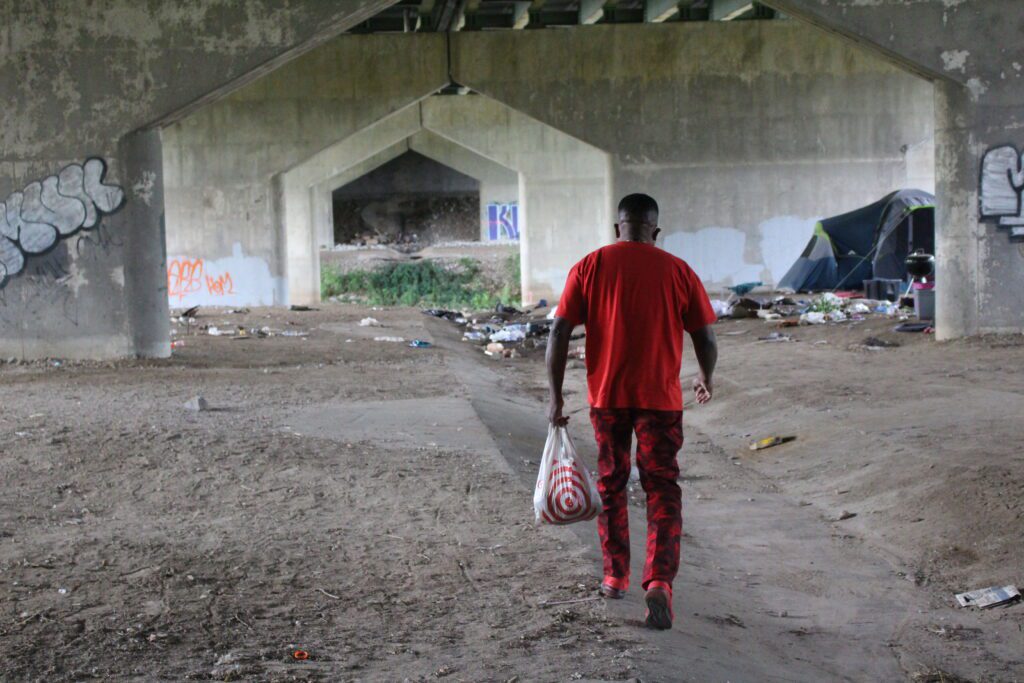Although veterans accounted for approximately 6% of Indiana’s total population, they accounted for approximately 11% of its total homeless population this year based on the 2023 PIT count. In addition to homelessness, some veterans are facing food insecurity, housing instability, a higher rate of suicidal ideation and a lack of basic resources.
Helping Veterans and Families (HVAF) is working to be part of the solution for veterans in Marion County. Located in downtown Indianapolis, they offer a multitude of services, including community outreach, peer mentoring, transitional and permanent housing, rental and utility assistance, therapy, employment services, a food pantry and a clothing pantry, aiming to be a one-stop-shop for veterans in need.
“We usually serve between 1200-1400 veterans each year,” said Emmy Hildebrand, CEO of HVAF. This number has been climbing lately due to the rising costs of housing, utilities and food.
Each month about 250 veterans visit the HVAF food pantry — open every Tuesday — according to Hildebrand.
LaWanda Girton, community engagement and partnership coordinator at the Roudebush VA Medical Center, said, “There are going to be some people who served who will never step foot in the VA.”
Consequently, the VA’s community engagement office wants to meet people where they are. By hosting town halls and other events in rural, urban and suburban communities, they are working to connect veterans and their families to provide the support they need. The office is also partnering with local organizations like hospitals and the parks department to better equip staff with resources specifically for veterans.
A community that cares
Girton said one of the main objectives for the VA to help increase veterans’ overall well-being is connectedness – between veterans and the VA as well as veterans connecting to one another.
Rodney Jackson, outreach coordinator for HVAF, participated in ROTC at Arsenal Technical High School for four years before joining the Navy. When he finished his service in 2003, he began working in various roles helping veterans.
“This is the only organization that did what they said, that actually helped military guys,” Jackson said. “When you come here, it’s like a wraparound service. I do the assessments on the street, then I turn them over to our case managers; then they’re touched by so many people.”
Jackson visits homeless camps almost daily to hand out food, clothing, tents, blankets and other essentials. Most of all, he works to build a rapport with the people he meets. He said sometimes they just need someone to talk to.
“I always give them my card and tell them anytime you need it, call me,” Jackson said. He had his own experience with homelessness. Though brief, he has never forgotten the experience, and that, along with the challenges some of his loved ones have faced, is what keeps him motivated to go out day after day.

Creating a sense of belonging is what HVAF hopes sets them apart from other organizations.
“We’re trying really hard to build community. We have several peer mentors on staff who have lived that life and walked that walk. They can engage with veterans right away and say, ‘I’ve been where you are, and there’s a path out of it,’” said Hildebrand.
Breaking down the barriers
HVAF offers as many onsite services as possible to reduce the number of trips a veteran would have to take to get help, and, understanding that it is already a big step to come in, they work toward making HVAF a place veterans want to come.
“We’re low barrier programming, so we don’t require veterans to be sober. We don’t require them to have a job or anything like that,” said Hildebrand.
Black veterans may face additional hurdles when getting help. To apply for permanent housing, a veteran must provide a qualifying diagnosis.
“People who are experiencing homelessness who are African American have a much harder time documenting their disability,” said Hildebrand. Whether that is due to the lack of consistent medical care or inability to access the necessary documentation, this requirement can keep Black veterans from more permanent housing solutions. HVAF has signed on to a larger community goal of reducing homelessness among Black veterans by 35% by 2025.
Mental health matters
Data collected by the University of Southern California indicates that 76% of homeless veterans experience substance use and mental illness. To address this need, HVAF has a therapist on staff, and they are expanding their substance use support groups.
“We know about 80% of the veterans we served this year report either a mental health diagnosis or substance use, so it’s a huge contributing factor to their homelessness, and we want to be able to help, and we’ve found that if we can offer a service in-house and it makes sense, veterans are more likely to engage,” said Hildebrand.
They also partner with other organizations, including the local Veterans Affairs office, Eskenazi and Midtown to refer people to substance use treatment and therapy.
As a licensed clinical social worker, Girton said her mental health background makes her aware of what to look for when she encounters someone who may be in crisis. The U.S. Department of Veterans Affairs reports that 20 veterans commit suicide each day. According to Girton, that number is far too high. The center’s goal is to reduce the number of suicides by offering mental health support and even gun locks.
“One life lost to suicide is one life too many,” said Girton who is the current chair of the Black Suicide Prevention Taskforce.
What’s next? (sub-heading)
Expanding the VA’s reach into Latino and tribal communities is a top priority for Girton. She is also working toward assisting school personnel with how to help children from military families better integrate into schools, believing that “the community should be ready and prepared” for when veterans come home.
HVAF say they could do even more with more financial resources – during Covid, the organization received additional funding, and they saw a 35% drop in homelessness.
“When you give us additional resources, we can serve the people you want to serve, and we can move them out of homelessness and into self-sufficiency,” Hildebrand said. “We really believe that no veteran should be homeless. So, we need to build a system where if a veteran is on our streets, they have an opportunity to come in off the streets and get the help they need.”
Contact Editor-in-Chief Camike Jones at 317-762-7850.
Camike Jones is the Editor-in-Chief of the Indianapolis Recorder. Born and raised in Indianapolis, Jones has a lifelong commitment to advocacy and telling stories that represent the community.








